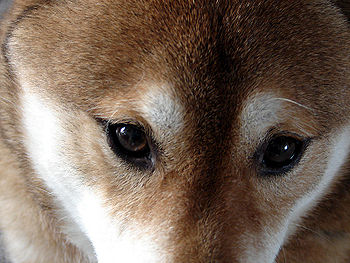
Dog Blindness
Veterinarian Reviewed on June 22, 2012 by Dr. Janice Huntingford
Dog Blindness
As animal’s lovers, we are always aware that our beloved dog could get ill at any time. As they get older, dogs do tend to suffer from Dog Deafness and may even go blind, which can be worrying for both you and your dog. Dogs that are blind can continue to lead a very happy and healthy life; you will just have to adapt your home to suit your dog’s specific needs.
Reasons for Dog Blindness
There are many reasons why your dog may go blind. These include old age, disease and even trauma – which can also cause your dog to lose his sight. Some dogs may be able to regain their sight but, unfortunately, other dogs will not be so lucky and will have to learn to live with being blind. Severe disease such as Dog Cataracts, infections, retinal detachment and Dog Glaucoma, can all affect your dog’s sight, and these all have the potential to lead to complete blindness if not treated correctly. If your dog loses his sight completely very quickly, it can be extremely traumatic for him as well as you; you will also have to learn how to deal with your dog and his new behavior.
Coping with a blind dog
If your dog loses his sight slowly over time then, in most cases, he will have this time to adapt slowly to his loss of sight and it will be easier for him to be comfortable in his surroundings once he does experience a complete loss of sight, by remembering where all the items in the home are.
You can often tell if your dog is losing his sight by moving the furniture and seeing if he walks into the furniture in their new positions. Other signs are if your dog struggles to find his water and food bowls, excessive sleeping or if he experiences Dog Lethargy and no longer wants to play.
If, however, your dog loses his sight rapidly, it can be extremely worrying for him. Your dog will no doubt be quite scared and unsure of himself and his surroundings. Therefore you will have to deal with behavior changes within him and help your dog to adapt as easily as possible. Your dog over time will establish his own routine; he will know where items are and will probably follow the same route every day.
Living with your dog day to day
Make sure that you move the furniture around your house as little as possible, as this will help your dog stick to his new familiar routine. You will also need to ensure that your house is kept tidy. If you have children you will need to remind them to pick up all of their toys and clothes so that your dog does not accidentally trip over them. Your dog may get distressed, if it falls over items on the floor which has been left by accident. It will think anything that blocks his daily routine may be an enemy and may become very defensive. Also remember that your back yard is also part of your dog’s home and so don’t leave toys, or garden equipment lying around. If you have a pool, think about fencing it in as if your dog stumbles in there by mistake this could have devastating effects.
Although they may seem very small to you, these changes will be huge to your blind dog.
Adopting a blind dog isn’t as daunting as you may think, you will need to take things one day at a time until they learn where everything is, but once they establish their routine they will be as loving and playful as any other dog. They will require more planning and consideration than other dogs but are great companions; you will have a bond that no other pet owner has.
Sign up for our newsletter and receive more articles and the latest pet health updates and special offers.
Our Expert
 Dr. Janice Huntingford
Dr. Janice HuntingfordJanice Huntingford, DVM, has been in veterinary practice for over 30 years and has founded two veterinary clinics since receiving her Doctor of Veterinary Medicine at the Ontario Veterinary College, University of Guelph. She has studied extensively in both conventional and holistic modalities. Ask Dr. Jan

